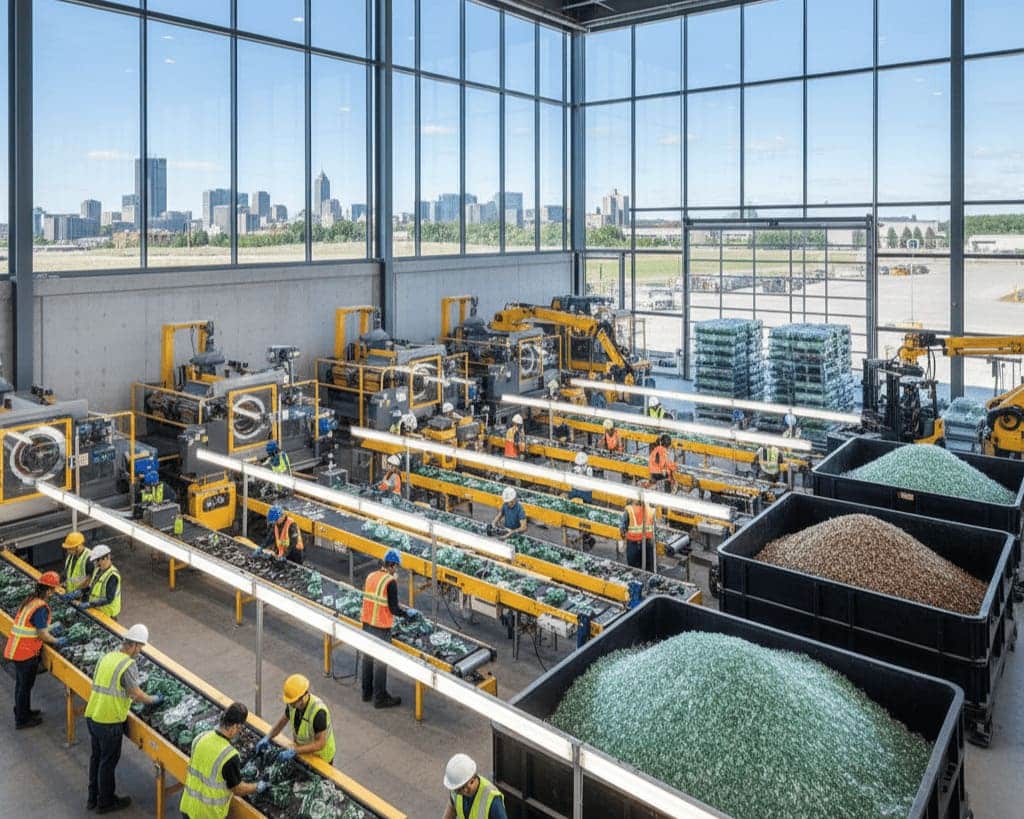If you live in Winnipeg and are wondering where to drop off extra recyclables, hazardous items, or bulky materials after a cleanout, this guide is for you. “
Recycling depot Winnipeg” is the phrase many homeowners type when they need to find the nearest 4R depot, battery or electronics drop-off, or a place that accepts paint and propane tanks. I’ll walk you through the main depot options, explain what each site accepts, offer practical tips for preparing materials, and show when a local pickup service, such as Mr. Garbage, makes sense. Short, clear, and useful, so you can get the job done responsibly.
What a recycling depot in Winnipeg does and why it matters
A recycling depot in Winnipeg is a municipal or approved facility that accepts household recyclables and many special items that should not go in the blue cart or regular garbage. Depots are set up to receive items that require separate handling: household hazardous waste, electronics, large cardboard, bulky metal, and more. Using the right depot keeps hazardous items out of landfill, protects recycling equipment, and supports local processors who turn materials back into useful products.
Depots also help households avoid the common mistake of putting problem items into curbside recycling. When the wrong materials are mixed in, entire loads can be downgraded or rejected at the Material Recovery Facility. That is why depots exist: they are the municipal safety valve for things the blue cart cannot manage.
Where to find a recycling depot that Winnipeg residents use most
City of Winnipeg 4R Depots: Your first stop
The City of Winnipeg operates the 4R depots (for reuse, recycling, and recovery). These depots accept a wide range of household items, including blue-cart recyclables, oversized cardboard, clean lumber, household hazardous materials, used oil and filters, and select bulky items. The city publishes an up-to-date accepted-items list and recommends checking it before you go. The 4R network is the most reliable municipal option for homeowners.
Specialized collection partners: Electronics and batteries
Not all depots accept every specialty item. For electronics, use the Recycle My Electronics / EPRA network, which lists authorized drop-off locations in Manitoba. For batteries, Call2Recycle operates a nationwide network of retailer drop-off points; many Winnipeg Home Depot stores participate in that program. These specialized networks are set up to handle hazardous or high-value materials safely and to ensure proper downstream processing.
Retail take-back and stewardship programs
Certain products are covered by producer or retailer take-back programs. Paint, some light bulbs, and specific household chemicals often fall under producer stewardship, meaning product stewardship programs and retailers will point you to suitable drop-off sites. The depot PDF and stewardship pages list what each program accepts and where to bring items. Always confirm acceptance rules before you travel.
What to bring to a recycling depot in Winnipeg
Blue-cart overflow and household recyclables
If your blue cart fills up, depots typically accept overflow paper, cardboard, bottles, and cans. Flatten boxes and keep paper dry to avoid contamination. Depots separate recyclables into streams that go to regional processors and mills. That separation at the depot level supports higher-quality recycling.
Household hazardous waste and how depots manage it
Household hazardous waste includes leftover paint, solvents, pesticides, and certain cleaners. Depots accept many of these items and route them to licensed processors. Keep products in their original containers when you can, and do not mix chemicals. Depot staff will advise on the safest route if items are unknown.
Electronics and batteries: Special rules
Electronics must go to approved e-waste drop-offs to ensure safe data handling and material processing. Batteries, especially rechargeable and lithium types, present fire risks if not handled properly; Call2Recycle and retailer bins are designed to accept them safely. Tape exposed terminals on larger lithium batteries and keep them separate for transport.
recyclemyelectronics.caHow to prepare materials before visiting a recycling depot Winnipeg
A short prep routine speeds your visit and reduces the risk of rejected loads:
- Keep materials sorted by type and put small items in boxes or bins.
- For electronics, remove personal data and remove or erase storage drives if you can. If not, ask a recycler about certified data destruction.
- Place loose shredded paper in a clear bag so it does not blow away.
- Keep hazardous liquids upright and in sealed containers. Do not mix chemicals.
- Tape battery terminals and secure bulky items in your vehicle to prevent spillage.
Common questions: Does Home Depot recycle batteries and light bulbs?
Home Depot and battery recycling
Many Home Depot Canada stores participate in the Call2Recycle program and host battery drop-off bins for rechargeable batteries. Check the Call2Recycle locator or your local store’s page for exact acceptance and store participation. This is a convenient option for small household batteries.
locations.call2recycle.caHome Depot and light bulbs
Retailer policies for light bulbs vary. In recent updates, some stores adjusted in-store acceptance for compact fluorescent lamps and tubes. Always check the store’s recycling program page or the retailer’s guidance before bringing fluorescent tubes or CFLs. When in doubt, your municipal 4R depot will indicate whether it accepts specific lamp types for safe handling.
homedepot.caFinding “recycling depot near me”
Use municipal and stewardship locators.
Start with the City of Winnipeg 4R depot pages for municipal drop-off sites. For electronics and batteries, use EPRA’s Recycle My Electronics locator and Call2Recycle’s site to find participating retailers and drop-off points. These locators show accepted items and often list hours and contact details.
Call ahead and check the accepted items list
Depot rules change occasionally, and some items require special handling. Calling ahead or checking the depot’s accepted-items PDF prevents wasted trips and ensures the right processing path. If you have unusual materials, describe them to depot staff so they can advise on the correct route.
Real-world example: How one Winnipeg household handled a big cleanout
A homeowner cleared a basement and sorted items into bags for deposit: electronics, household chemicals, batteries, and paper. They used the city depot for the blue-cart overflow, EPRA drop-off for old monitors and printers, and a retail battery bin for rechargeable cells. For the heavier, bulky items, they booked a pickup with a local provider who sorted the load and took the remaining wood and metal to specialized recyclers. The combined approach used municipal depots, stewardship programs, and a pickup service to keep materials in the proper recycling stream.
When to call a pickup service: How Mr. Garbage fits in
Sometimes a depot trip is impractical. If you have mobility constraints, lots of heavy items, or a mixed load of material types, a pickup service is often the best choice. Mr. Garbage provides curbside-style pickups and sorts materials for route-to-depot or route-to-specialized processors. Their crews can also provide documentation for disposal or recycling, which is handy for organized cleanouts or renovation projects.
Use a pickup service when:
- You have bulky or heavy loads that are hard to transport.
- You need a single solution for mixed materials.
- You want help ensuring hazardous or specialty items reach the correct processor.
Mr. Garbage works with local depots and certified processors to make sure materials are handled appropriately and kept out of the blue cart when necessary. Mentioning Mr. Garbage here is practical: homeowners use trusted local services to bridge gaps in depot access and logistics.
recyclemyelectronics.caWhy deposit use helps Winnipeg meet diversion goals
Municipal depots and stewardship networks play a central role in diverting problem items from landfill. National and provincial reports show diversion performance varies by province, and programs that combine municipal depots with producer take-back systems are the most effective at recovering challenging materials. Using depots and stewardship drop-offs supports local recycling markets and reduces environmental impacts from improper disposal.
Expert perspective: “Municipal depots are the backbone of local recycling systems,” says Dr. Sarah Bennett, a waste-systems consultant familiar with Manitoba programs. “When homeowners use the depot network and specialized take-back programs, we see far less contamination and more material returning to manufacturers and processors.”
Quick checklist before you visit a recycling depot Winnipeg
- Check the depot’s accepted-items list online.
- Sort materials by type at home.
- Secure batteries and remove data from electronics where possible.
- Keep liquids upright and sealed.
- Call ahead if you have treated wood, asbestos suspicion, or other potentially hazardous building waste.
These steps reduce surprises and keep your visit efficient.
Safety and rules to remember at depots
- Follow depot staff instructions and traffic flow signs. Depots often have specific drop zones for different materials.
- Never mix unknown chemicals. If an item is unlabeled, tell staff, and they will advise the safest route.
- Tape lithium battery terminals and handle large batteries with care to avoid damage and short circuits. locations.call2recycle.ca
Following the rules keeps the site safe for depot workers and other residents.
Conclusion
Finding the right
recycling depot Winnipeg depends on what you need to drop off. Start with the City of Winnipeg’s 4R depots for blue-cart overflow and many household items. Use EPRA / Recycle My Electronics for e-waste and Call2Recycle or participating retailers for batteries. When depot trips are inconvenient or you have a mixed, heavy, or awkward load, a trusted pickup service like Mr. Garbage provides a convenient, documented solution and ensures materials are routed to the correct processors.
If you want help with a large cleanout or prefer a single pickup that sorts and routes everything responsibly, visit
Mr. Garbage to arrange a pickup or get advice on which depot to use for each material. Using the right depot and routes keeps Winnipeg cleaner, safer, and more circular.
Frequently Asked Questions (FAQs)
Q1: What is the nearest recycling depot Winnipeg residents can use?
A1: Start with the City of Winnipeg’s 4R depots. They accept blue-cart overflow and many special items. Use the city pages or call the depot to confirm accepted items and hours.
Q2: Does Home Depot recycle batteries and light bulbs?
A2: Many Home Depot Canada stores participate in Call2Recycle for rechargeable batteries. Policies for light bulbs vary; check the store’s recycling program page or take bulbs to a 4R depot if you are unsure.
Q3: Can I drop off hazardous household chemicals at a recycling depot Winnipeg?
A3: Yes. Many 4R depots accept common household hazardous materials such as leftover paint, cleaners, and pesticides. Keep containers closed and in their original packaging when possible, and tell depot staff if an item is unknown.
Q4: Where can I recycle old electronics in Winnipeg?
A4: Use the Recycle My Electronics / EPRA locator to find authorized electronic drop-off sites in Winnipeg. Depots and approved retailers participate in the program.
Q5: When should I book a pickup with Mr. Garbage instead of going to a depot?
A5: Book a pickup when you have heavy items, mixed loads, mobility challenges, or if you want a single, convenient solution that sorts and routes materials to the correct processors. Mr. Garbage coordinates with local depots and certified processors to ensure proper handling.

